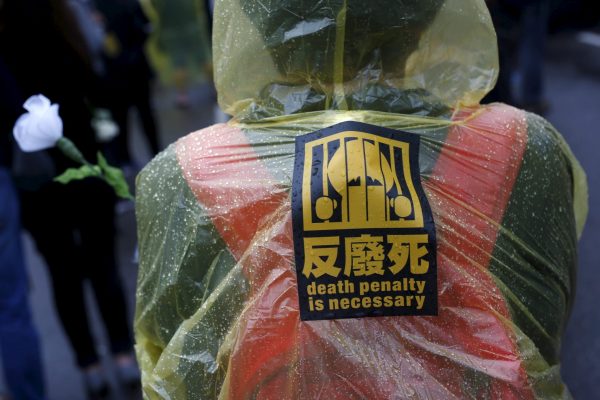The pace of executions in Taiwan has waxed and waned over recent decades — after a nearly five-year pause in executions, 33 people were executed between 2010 and 2016. Today, the death penalty remains legal, popular and contentious.
Treason, piracy and serious drug offences are among the crimes for which courts may impose a death sentence, although the overwhelming majority of executions in the last decade have been for murder. Retention of the death penalty is permitted but discouraged under the International Covenant on Civil and Political Rights (ICCPR), which Taiwan adopted as domestic law in 2009.
In January 2017, a group of independent human-rights experts invited by the Taiwanese government to review compliance expressed its ‘strong regrets that there has been no progress in the abolition of capital punishment as the utmost form of corporal punishment’. Since the adoption of the ICCPR, there have been procedural adjustments — such as requiring appellate sentencing hearings in all capital cases — and a concomitant drop in the number of death sentences finalised by the courts. But there has been no change in the government’s basic position that the death penalty is legal.
The death penalty is also popular. A 2016 poll by the National Development Council found that nearly 88 per cent of the public were against its abolition. This high degree of public support is less surprising when viewed in light of the poll’s timing — it immediately followed a public outcry over the grisly murder of a four year old girl. But an earlier 2015 poll similarly found that over 80 per cent of people did not support abolition.
It is also hard to find any lawyers, judges or legal academics in Taiwan who expect this support to markedly decrease anytime soon. They hope to gradually increase public support for abolition by exploring accompanying reforms aimed at shoring up public safety, including the possibility of introducing life without parole.
Despite widespread support among the general public, the death penalty remains contentious in political circles. In 2016, a legislator proposed an amendment to the criminal law that would require the death penalty in most murder cases where the victim is a child. In contrast, at the 2016 European Union–Taiwan Human Rights Exchange Programme a group of legislators met with EU human rights experts to discuss possible alternative sentences to the death penalty.
The executive branch has likewise displayed discordant views. Wang Ching-feng, who served as president Ma Ying-jeou’s minister of justice from 2008–2010, resigned over her refusal to sign execution orders. The next minister, Tseng Yung-fu, promptly approved the execution of six people on death row and signed 21 execution orders in total. His successor, Luo Ying-shay, signed 12 execution orders during her tenure.
The current Minister of Justice, Chiu Tai-san, has been circumspect in his public remarks, calling for dialogue between those in favour of and opposed to the death penalty. President Tsai too has avoided taking a clear public stance since taking office, though in 2015 she did remark that abolition of the death penalty required both a social consensus and comprehensive complementary measures, neither of which she saw present in Taiwan.
Looking to other countries’ experiences, abolition is more often led by political elites than motivated by public clamouring against the death penalty. President Tsai has so far failed to provide such leadership. The death penalty was raised in passing at the National Judicial Reform Conference that President Tsai convened, but it was not included as a specific topic for discussion, nor was there any mention of the death penalty in the summary of major issues.
Tsai’s reluctance to push the death penalty into the spotlight is not surprising considering that her approval rating dipped below 30 per cent earlier this year. In addition, her political capital is already stretched thin with an ambitious agenda underway, including tackling controversial pension reform.
The reality of the death penalty being retained has prompted non-governmental organisations to take a multifaceted approach to curbing the use of the death penalty. For example, in October 2017 the Taiwan Alliance to End the Death Penalty, Taipei Bar Association’s Human Rights Committee and Legal Aid Foundation held a conference on the death penalty.
The Taiwan Innocence Project for its part has shown that Taiwan is not immune to the worldwide phenomenon of wrongful convictions, including death penalty cases.
As 2017 draws to a close, it appears likely that it will be an execution-free year in Taiwan. But there still remains a lack of momentum for outright abolition in the executive and legislative branches, and Taiwan’s Constitutional Court has not yet intimated that it might issue a decision rendering the practice unconstitutional. As such, the death penalty is expected to linger, experiencing periods of disuse disrupted by occasional executions. This enduring use of the death penalty remains a stain on Taiwan’s otherwise steadily improving record of championing international human rights norms.
Margaret K Lewis is a Professor of Law at Seton Hall University and a Fulbright Senior Scholar at National Taiwan University College of Law. Follow her on Twitter at @MargaretKLewis.

